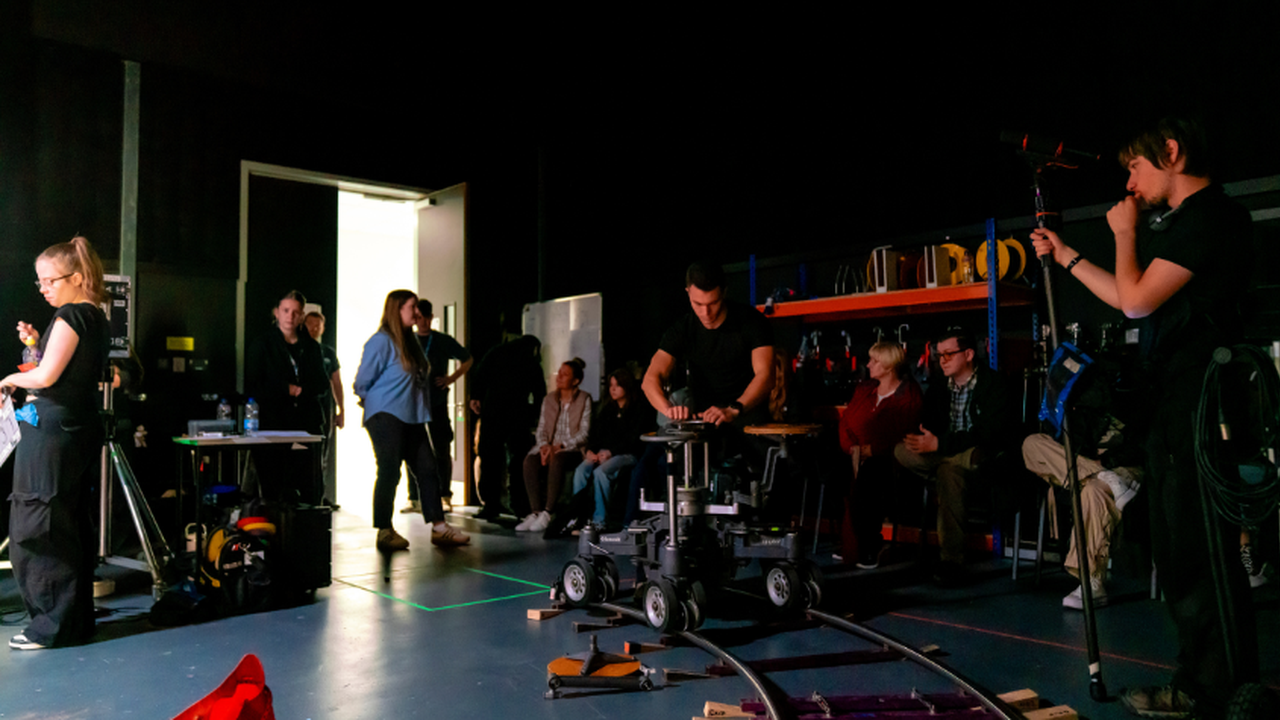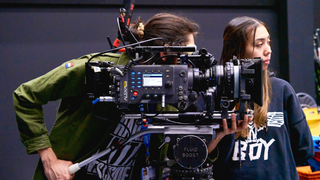Are Film Schools Worth it For Your Career?

At UCEN Manchester we always say there is no such thing as a silly question.....but this one tests that theory to the limit!
Yes, film schools are worth it! If you're passionate about filmmaking, a structured education can provide the skills, experience and industry connections needed for success.
The UK film industry is expected to experience significant growth thanks to new government tax incentives, creating a surge in opportunities.
This makes now an ideal time to pursue a film degree and establish your career, so that you can position yourself to capitalise on the industry's expansion.
In this article, we’ll explore why attending a film school is a valuable investment.
What do you learn in film school?
During film school, you'll gain practical skills in camera operation, lighting, sound recording, editing and directing, alongside theoretical knowledge of film history and narrative structure.
You'll learn how to develop compelling stories, manage productions, and collaborate effectively with a crew. Ultimately, film school equips you with the tools and experience necessary to pursue a career in the dynamic world of film and content creation.
What are the benefits of film school?
1. Hands-on, guided learning
Film school prioritises practical experience, allowing you to learn by doing under the guidance of industry experts. You'll operate professional-grade equipment, experiment with different techniques, and immediately apply theoretical knowledge to real-world projects. This helps students develop a deep understanding of the filmmaking process, far beyond what textbooks and self-teaching can offer.
2. Networking opportunities
Networking is one of the most important factors in having a successful career. As a film school student, you'll collaborate with fellow aspiring filmmakers, forming lasting relationships that can lead to future projects and collaborations.
At the Manchester Film School, part of UCEN Manchester, our tutors are seasoned professionals offering mentorship and guidance. We also regularly have industry guest speakers who provide insights and potential connections. Also, film school events and screenings offer opportunities to meet producers, distributors and other industry professionals, expanding your professional network significantly.
3. Access to high-end equipment
Film schools provide access to state-of-the-art cameras, lighting, sound equipment and editing software. You can experiment with professional tools and develop a strong technical foundation. You'll learn to handle industry-standard gear, which is essential for producing high-quality content.
4. Improved confidence
The film industry is demanding and you’ll need confidence to become a success. Through practical experience and constructive feedback, film school helps you build confidence in your creative abilities. You'll gain the skills and knowledge necessary to tackle complex filmmaking challenges. This increased confidence can be translated into greater assertiveness on set and develop a stronger ability to pitch your ideas.
5. Build a portfolio
Film school provides structured opportunities to create a diverse portfolio of work. You'll produce short films, documentaries and other projects that showcase your skills and creative vision. A strong portfolio is essential for securing internships, jobs and funding for future projects. Film schools often provide guidance on how to present your portfolio effectively to potential employers and collaborators. This portfolio demonstrates your abilities to potential employers and collaborators.
6. Learn to work in a team
Filmmaking is inherently collaborative and film school emphasises teamwork. You'll learn to communicate effectively, delegate tasks and work harmoniously with a diverse crew. This experience develops crucial interpersonal skills that are essential for successful collaboration on professional film sets and understanding different roles and responsibilities within a film crew is crucial.
7. Placements and work experience
Film schools offer opportunities for placements and work experience on professional film sets or in production companies. These experiences provide invaluable insights into the industry and allow you to apply your skills in a real-world setting. These opportunities can often lead to future employment and provide a crucial stepping stone into the industry.
8. Explore career opportunities
Film school exposes you to a wide range of career paths within the film and content creation industry. You'll learn about different roles, from directing and cinematography to editing and producing, so you can identify your strengths and interests. This exploration helps you develop an understanding of your passions, make informed decisions about your career goals and develop a targeted approach to job hunting.
9. Build a stand-out CV
Graduating from film school with a strong portfolio and practical experience makes your CV stand out to potential employers. You'll have a competitive edge in the job market, demonstrating your dedication to the industry. With work experience and placement opportunities, film school provides opportunities to gain industry-relevant skills and experience, which are highly valued by employers. Your CV will reflect that you have the skills needed to succeed.
10. Film school is fun!
The best thing is - film school is a highly engaging and enjoyable experience! There are so many opportunities and experiences fuelled by creativity and hands-on learning. You'll spend your days immersed in the world of filmmaking, working on exciting projects and collaborating with passionate individuals. You get to be around a community of creative people who’ll support you to express your artistic vision and create amazing films!
What skills will you learn in a film making course?
Camera operation
You'll learn to handle various cameras, understand composition and master essential camera movements. This skill is fundamental for capturing visually compelling footage and for becoming a skilled filmographer.
Lighting techniques
Understanding lighting is an underrated skill that can help you in professional film production. You'll explore different lighting setups and learn to manipulate light to create mood and enhance visuals.
Sound recording and design
Sound recording goes just beyond simple microphones. You'll gain expertise in capturing clear audio and designing immersive soundscapes, and learn about the best microphones for various projects. Quality sound is essential for engaging storytelling and building an atmosphere.
Film and video editing
Knowing how to navigate editing software is an essential filmmaking skill. You’ll learn how to master editing software and learn to assemble footage into a cohesive narrative to make the story truly come to life.
Screenwriting and story development
From the conception of an idea to the final product, good filmmaking requires excellent storytelling and screenwriting. You'll learn to craft compelling narratives, develop characters and structure screenplays.
Directing
One of the most important roles on a film set, directors guide actors, manage a crew and translate a script into a visual medium. Directing brings the creative vision to the screen, and it is an important skill to have.
Want to become a director? Learn more about how to become a film director here!
Producing
You'll gain skills in planning, budgeting, and managing film productions. Producing ensures a film is made efficiently and effectively.
Content creation for digital platforms
You'll learn to adapt filmmaking skills for online platforms, creating engaging content for diverse audiences. Digital content is increasingly important in today's media landscape and is required for a wide range of industries.
Production planning and management
Making a film is a huge logistical effort and everyone needs to perform their role effectively. However, this requires great management. You'll learn organisational skills, how to create schedules and manage resources.
Do you need a film degree for employment in film?
While a film degree isn't strictly required for employment in the film industry, it provides a very strong competitive advantage. It offers structured training, practical experience and crucial networking opportunities that can be difficult to obtain otherwise.
While yes, you might not need a degree, getting your first opportunity without a degree as a young person can be incredibly difficult! A film degree can significantly improve your chances of getting your foot in the door of your dream career, especially with opportunities for industry placements and networking!
Hear from our film students: Madelyn's First Steps Towards Dream Job in TV and Film
How much does film school cost?
For a first undergraduate degree in film at a UK institution, tuition fees are typically around £9,250 per year and can be funded by Student Finance England.
How long is a film school course?
A typical film school degree is 3 years long.
Why UCEN Manchester is the best film school in the north
UCEN Manchester offers a top-tier film education in the North. Here, we emphasise practical, industry-relevant training. Our BA (Hons) Film Production & Content Creation course provides hands-on experience, professional mentorship, and access to high-end equipment.
Students benefit from award-winning instruction and valuable work placement opportunities, all within the vibrant creative hub of Manchester. If you're serious about a career in film, UCEN Manchester Film School is the place to be. Enrol today and begin an exciting career in film.

